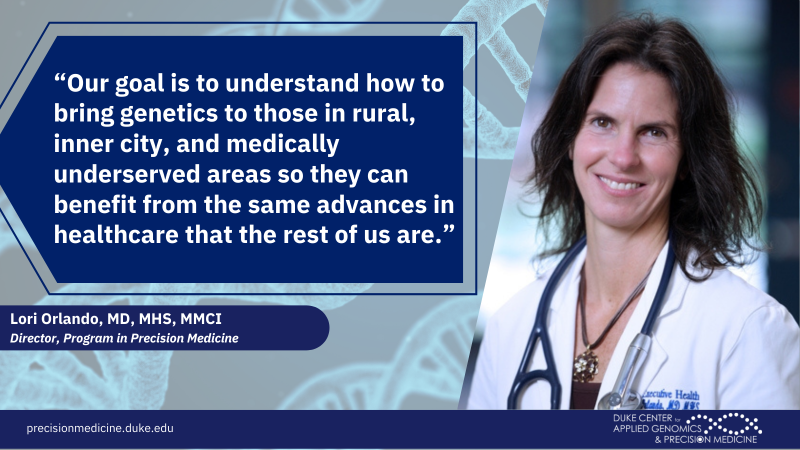
Director of the Precision Medicine Program in CAGPM, Lori Orlando, MD, MHS, MMCI, has received an R01 grant to pursue, "Deploying a genomic-medicine risk assessment model for diverse primary care populations and settings." The new care delivery model is referred to as "Genomic medicine Risk Assessment Care for Everyone” (GRACE). This is Dr. Orlando's first R01 grant.
Orlando's research focuses on family health history (FHH) being a critical component of genomic medicine that is essential for both identifying individuals at risk for hereditary conditions and for contextualizing results of genetic testing. This data collection method has continued to be broadly underutilized and unappreciated in clinical care.
The goal of Orlando's proposal is to develop a scalable end-to-end solution for risk assessment and management that meets the needs of low resource settings. The central hypothesis is that combining FHH-driven risk assessment, a literacy-enhanced interface, family engagement (through social networking platforms for data gather and risk sharing), and a genetic testing delivery system, will create a solution that engages and increases the proportion of diverse patients who are identified as at increased risk, who undergo testing, and, when appropriate, who initiate cascade screening among relatives.
“This proposal takes the next step in understanding how to assess and manage disease risk in community clinic populations that don’t have easy access to the usual genetic resources that those of us in academic centers do. Our goal is to understand how to bring genetics to those in rural, inner city, and medically underserved areas so they can benefit from the same advances in healthcare that the rest of us are," said Orlando.
The GRACE model intends to develop and deploy pre-implementation assessment at clinical sites with highly diverse patient populations to select the most appropriate integration options and pathways for both patients and providers, in addition to performing a randomized implementation-effectiveness pragmatic hybrid trial to assess implementation and effectiveness outcomes relevant to these diverse populations.
Outcomes will include reach, uptake, clinical utility, accessibility, genetic testing frequency, genetic testing results, and cost-effectiveness.
Orlando is also author of, "Managing Health in the Genomic Era: A Guide to Family Health History and Disease Risk"